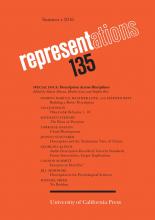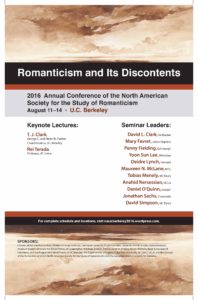Introduction to the special issue Description Across Disciplines
edited by Sharon Marcus, Heather Love, and Stephen Best
The introduction begins …
Academics don’t necessarily know what description is, but they know they don’t like it. “That talk was wonderfully descriptive; let’s give him the job”—said no one ever. When scholars from multiple disciplines gather to evaluate grant proposals, they can usually agree on one thing: the wisdom of rejecting any project they consider “merely descriptive.” And at least one university department’s grading rubric formalizes its low judgment of work that “is correct but largely descriptive, lacking analysis” by assigning such papers a C. Boring and static, rote rather than creative, reproductive rather than productive: description in such moments does not even rise to the status of a necessary evil. Instead, it is defined by failure or falling short: lacking a compelling argument or organizing perspective; insufficiently self-conscious of its own procedures; basic in the bad sense of naive and mechanical. Even the clearest accounts of description often contrast it to what it is not—not interpretation, not explanation, not prediction, not prescription.
Yet description is everywhere, a ubiquitous and necessary condition of scholarship, and in practice, if not in preaching, attitudes toward it vary across and within disciplines. Although scientists aim at explaining causal mechanisms and identifying predictive laws, many consider description an activity sufficiently worthy in its own right that one can find highly cited articles whose titles identify them as “descriptions”—of forest geckos, road surface roughness, molecular excitations, or valence bonds. Social scientists express more overt ambivalence about description. In 1980, economist Amartya Sen wrote, “It is fair to say that description as an intellectual activity is typically not regarded as very challenging. To characterize a work in the social sciences as ‘purely descriptive’ would not normally be regarded as high praise.” Three decades later, John Gerring similarly noted that in political science description “has come to be employed as a euphemism for a failed, or not yet proven, causal inference. Studies that do not engage causal or predictive questions, or do not do so successfully, are judged ‘merely’ descriptive.” But Sen and Gerring also contest this view by underscoring the fundamental importance of descriptions in social science and by foregrounding the skills needed to produce them. Nor are they alone. Many historians and ethnographers would say that without description, albeit of a highly interpretive kind, they could not produce historical narratives or field notes. Humanists often keep their engagement with description tacit and articulate their explicit discomfort with “mere description” by insisting (rightly) that description cannot be separated from interpretation. Even so, art historians, literary critics, and musicologists must learn to describe the paintings, sculptures, texts, and musical works that they study.
We believe that description is a core, if unacknowledged, method in all scholarship and teaching. In order to proceed, interpretations, explanations, and prescriptions must give an account of—describe—what they interpret, explain, or evaluate. Description makes objects and phenomena available for analysis and synthesis, and is rarely as simple as its critics imply. An elusive object that travels by many names, and sometimes by no name at all, description’s dictionary definitions include representation, drawing, report, portrayal, and account. Description can take many forms, including lists, case studies, sequences, taxonomies, typologies, genealogies, and prevalence studies, and it involves many actions, including observing, measuring, comparing, particularizing, generalizing, and classifying, using words, images, and numbers.
We write from the perspective of literary critics who became interested several years ago in questioning the dominance of interpretive methods in our discipline. In 2009, Stephen Best and Sharon Marcus published a special issue of Representations called “The Way We Read Now.” The introduction to that volume gathered a set of recent developments in literary studies under the rubric “surface reading,” referring to methods trained on “what is evident, perceptible, apprehensible in texts.” In 2010, Heather Love published an essay called “Close but Not Deep” that proposed the observational social sciences as a model for descriptive readings of literary texts. It was in part the controversy generated by these essays that prompted us to take a closer look at description: to assess what were widely cited as its limitations, or even dangers, and to further explore what we still imagined to be its unacknowledged and even untapped potential. What, we wondered, would it mean to acknowledge the ways that our critical and pedagogical practices make description central—to prosody, plot summary, histories of the book, even to allegorical and symptomatic interpretations? What would we learn if we widened our purview to ask scholars and practitioners from disciplines beyond literary studies to reflect on their own practices of description? Continue reading (free access until October 31, 2016) …
Universally practiced across the disciplines, description is also consistently devalued or overlooked. In this introduction to the special issue “Description Across Disciplines,” Sharon Marcus, Heather Love, and Stephen Best propose that description is a critical practice more complex (and less contradictory) than its detractors have taken it to be. They argue that turning critical attention toward description’s nuances gives us access to the ways that scholars conventionally assign and withhold value and prestige. The authors set forth a number of principles (using their contributors’ essays as a guide) toward the end of “building a better description.”
SHARON MARCUS is Dean of Humanities and Orlando Harriman Professor of English and Comparative Literature at Columbia University as well as the co-founder and co-editor in chief of Public Books, an online review of books, arts, and ideas.
HEATHER LOVE is R. Jean Brownlee Term Associate Professor at the University of Pennsylvania and the author of Feeling Backward: Loss and the Politics of Queer History (Harvard) and the editor of a special issue of GLQ on Gayle Rubin (“Rethinking Sex”).
STEPHEN BEST is Associate Professor of English at the University of California, Berkeley, and author of The Fugitive’s Properties: Law and the Poetics of Possession (University of Chicago, 2004).



 On Friday, August 12,
On Friday, August 12,